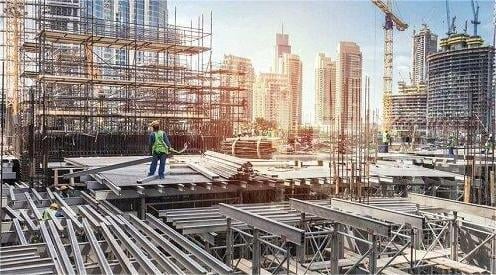Publisher: Maaal International Media Company
License: 465734
Report: Saudi construction sector is on track to become the world’s largest, with a volume of $180 billion by 2028
Saudi Arabia is on track to become the world’s largest construction market by 2028, driven by the momentum of massive infrastructure projects and Vision 2030 initiatives. The kingdom is working on several megaprojects, such as NEOM, Qiddiya, Diriyah, King Salman Airport, and others. The Kingdom’s construction sector is expected to reach approximately $181.5 billion in 2028, compared to $141.5 billion in 2023, a significant increase that represents one of the most prominent transformations in the Saudi economy toward diversification, according to Research and Markets.
According to the report, the construction equipment market in the Kingdom is expected to grow from 35,329 units in 2023 to 49,690 units in 2029, at a compound annual growth rate (CAGR) of 5.85%, supported by the expansion of housing projects, the development of airports and ports, and transportation and energy networks. The NEOM, Red Sea, and Diriyah projects are among the most prominent projects reshaping the Kingdom’s urban and economic landscape. NEOM, which currently employs approximately 140,000 workers and is expected to reach 200,000 by 2025, is one of the largest construction sites in the world.
The report also indicates that the Kingdom is developing King Salman International Airport to be the largest in the world, with a capacity of 120 million passengers annually. The project spans an area of 57 square kilometers, and some phases are expected to be operational between 2026 and 2030.
اقرأ المزيد
Urban growth includes the development of Riyadh’s first public bus network, the establishment of a national electric vehicle infrastructure company, and the expansion of the railway network to more than 8,000 kilometers.
Industrially, the Kingdom has invested significantly in earthmoving equipment, which accounted for the largest share of the construction equipment market in 2023, specifically crawler excavators suitable for sandy terrain. 20-ton and 50-ton excavators emerged as the most in-demand equipment. The report concludes by emphasizing that the Kingdom is not only increasing its investments in the construction sector, but is also working to improve operational and logistical efficiency and develop waste management policies in major cities like Jeddah, given that daily waste production has risen to more than 5,000 tons.
This remarkable expansion in infrastructure reinforces the Kingdom’s position as an emerging urban economic power, steadily moving toward achieving the goals of Vision 2030, localizing industries, and leading the urban transformation regionally and globally.








